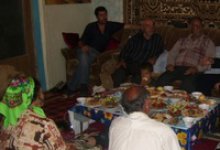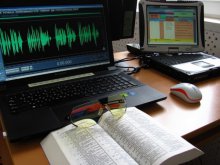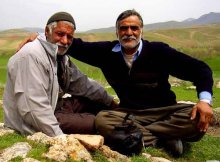 When a guest comes into a Kurdish home, the hosts normally say, “You have come to step on my head.” Such were the words of our Kurdish translator in the Moscow IBT office when we asked him about the Kurdish national tradition of receiving guests. To say that we were shocked is an understatement! The similar idiom in Russian would mean that we are extremely bothered with a person, annoyed by his behavior, and his actions cause terrible problems for us. Those who heard the Kurdish translator exchanged glances: what could he possibly mean? Did he mean to say that, unlike other people of the Middle East, Kurds do not have any tradition of hospitality? That they utterly dislike their guests? But everything fell into place when the translator deciphered his mysterious idiom. “To step on one’s head” in Kurdish indicates the utter humility of the host, who prostrates himself on the ground under the feet of his guest… It was quite the opposite of what we guessed.
When a guest comes into a Kurdish home, the hosts normally say, “You have come to step on my head.” Such were the words of our Kurdish translator in the Moscow IBT office when we asked him about the Kurdish national tradition of receiving guests. To say that we were shocked is an understatement! The similar idiom in Russian would mean that we are extremely bothered with a person, annoyed by his behavior, and his actions cause terrible problems for us. Those who heard the Kurdish translator exchanged glances: what could he possibly mean? Did he mean to say that, unlike other people of the Middle East, Kurds do not have any tradition of hospitality? That they utterly dislike their guests? But everything fell into place when the translator deciphered his mysterious idiom. “To step on one’s head” in Kurdish indicates the utter humility of the host, who prostrates himself on the ground under the feet of his guest… It was quite the opposite of what we guessed.
This is exactly what happens when we speak a foreign language and when we listen to foreign speech. We start analyzing it with our head but can’t perceive it directly with our heart. So our analysis – the images we form in our minds, our psychological reflections – are sometimes quite different from reality. One of the Kurdish translation team members, who lives in a village in the high mountainous region of Armenia, shares his testimony: “Before I became a Christian, the language of my thought was Armenian, which is not surprising. When we studied at school, the whole study process was in Armenian. And nowadays in our everyday life we read all the newspapers, all the books in Armenian. So it was only natural to think in Armenian. But when I converted to Christ, I started thinking in Kurdish!” Isn’t this an amazing testimony? His whole thinking process changed. This man used to live with his head, he used to live according to his mental state, but when he turned to Christ, he plunged into his inner  self, and he started living his life with his heart. “When you read the Bible in Armenian, you perceive it with your head, but it does not reach your heart,” the same team member, who is now a local pastor, continued. “But in Kurdish it sounds completely different. When we are reading Psalms in Kurdish, they sound natural”. This interview was taken by our audio technician when he visited the abovementioned Armenian village in order to make an audio recording of Psalms in Kurdish (Kurmanji dialect). And of course during his visit he drank from the deep draught of Kurdish hospitality. Indeed, the members of the village church made him “step on their heads.” When he tried to sit in a distant corner of the back row of the church, the pastor took him by his hand and brought him to the velvet-covered front row, and proclaimed to the whole community that this was their dear guest from Moscow, and since that time parishioners smiled at him cheerfully whenever they met him on the streets of their village.
self, and he started living his life with his heart. “When you read the Bible in Armenian, you perceive it with your head, but it does not reach your heart,” the same team member, who is now a local pastor, continued. “But in Kurdish it sounds completely different. When we are reading Psalms in Kurdish, they sound natural”. This interview was taken by our audio technician when he visited the abovementioned Armenian village in order to make an audio recording of Psalms in Kurdish (Kurmanji dialect). And of course during his visit he drank from the deep draught of Kurdish hospitality. Indeed, the members of the village church made him “step on their heads.” When he tried to sit in a distant corner of the back row of the church, the pastor took him by his hand and brought him to the velvet-covered front row, and proclaimed to the whole community that this was their dear guest from Moscow, and since that time parishioners smiled at him cheerfully whenever they met him on the streets of their village.
According to different estimations there are between 20 and 30 million Kurds in the world. The majority of them speak Kurmanji dialect, which is the language form used in IBT’s Scripture translation. In the post-Soviet countries, Kurdish communities are spread from Armenia’s mountainous villages to Siberia’s snowy plains. Another Kurdish pastor, who is IBT’s long-term translator, has recently brought to the IBT Moscow office news from the Kurdish diaspora in Siberia. “Now, when Psalms and Proverbs are already published in Kurdish, I started receiving many telephone calls from Siberia. There are many Kurdish businessmen in Siberia, not only in the cities, but also in the countryside. They have shops and stores of various sorts there. Usually they are not religiously minded, but rather religiously indifferent. Some of them just heard certain religious ideas orally, some of them consider themselves unbelievers. But the rumor has spread that new texts are available in Kurdish, and they are calling us and asking to send them something to read in their language. So we sent them this edition of Psalms and Proverbs. They called back and reported that they are in love with the text. All these small shops owners without exception are sitting in their shops and reading Psalms and Proverbs! They say:
 – It feels like our own native literature of olden times has started speaking to us. As though these are the very stories that our parents and ancestors did not have enough time to tell us orally. It’s such a pity that our parents are no longer with us. They would have been pleased to hear the very phraseology of this literature. We do not know whether we’ll become Christians in the future, but our hearts are drawn to our mother tongue. We hear it so deeply woven into these words of wisdom, into these stories, into these plots.
– It feels like our own native literature of olden times has started speaking to us. As though these are the very stories that our parents and ancestors did not have enough time to tell us orally. It’s such a pity that our parents are no longer with us. They would have been pleased to hear the very phraseology of this literature. We do not know whether we’ll become Christians in the future, but our hearts are drawn to our mother tongue. We hear it so deeply woven into these words of wisdom, into these stories, into these plots.
The book appeared to be useful also to school teachers in several regions, including Armenia and Georgia. In some places they have school lessons in Kurdish, and these teachers are now extensively using both the New Testament and Psalms and Proverbs as a source for their own thematic speeches.”
An interesting thing has happened. In the first testimony we saw how conversion to Christ revived one’s heart and revived the sources of inner speech in one’s mother tongue in this person’s life. This is the very thing that pushed several people to become translators, or readers of the future audio recordings, in the Kurdish project. And now, in this recent testimony from unbelievers we see how the resulting translations have an impact upon the translation team’s distant kinsmen who are dispersed in other lands. And the process reaches out beyond post-Soviet countries:
“I was at a meeting for Kurdish Bible translators living outside of the CIS,” our translator continues. “They made a decision to take our Bible translation as a source text for their own future translations. Representatives of several Kurdish diasporas from Middle Eastern countries decided not to be in a hurry to produce their own translations ahead of our team. And this is because in Turkey and several other places they partly lost grammar and syntax of their native language. It was simplified under the influence of Turkish or Arabic, the languages of the majority, the languages of education. Their written Kurdish has become poorer than the Kurdish preserved in CIS diasporas. But now when Kurds of other origins listen to the audio recording of Psalms, tears fill their eyes. No longer do they want to produce simplified texts. They say, – We are still using all these forms in our oral speech, but we had no idea that all the complexity and richness of our language can be rendered in written texts. Now we see the resources of our language, and we would like to restore and standardize its literary form in our countries as well.”
Right now the IBT team is choosing Kurdish musical tracks for the second version of the audio recording of Psalms – with ethnic musical accompaniment. We hope that this audio recording will touch even more hearts in this people that is tragically dispersed all over the world – people without a homeland, but with a strong love for their identity and a powerful search for their true self.
We would greatly appreciate your financial assistance towards this project.
If you prefer to send your donation through a forwarding agent in the U.S. or Europe,
please write to us and we'll provide the details of how this can be done.

Share: